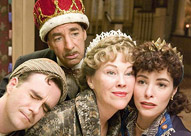Christopher Guest's latest comic masterwork departs a bit from the loose mockumentary format of Waiting for Guffman, Best in Show and A Mighty Wind. There are plenty of moments of outrageous hilarity, but in telling the story of a downward-spiral of narcissism that grips the cast of an overblown indie flick, Guest delivers a relatively straight-ahead (albeit still heavily improvised) narrative injected with unexpectedly edgy truths about the entertainment industry. It may not be the constant chortle-fest that was Guffman, but it's a shrewd showbiz satire by someone who knows a thing or two about Hollywood. And it's one of the best films of 2006.
The indie in question is a dreadful 1950s-period melodrama called Home For Purim (!). Among its central characters are a dying Southern Jewish matriarch (brilliant Catherine O'Hara as a washed-up siren named Marilyn Hack), her longsuffering husband (Harry Shearer as way-too-smiley TV-advert actor Victor Allan Miller), and their contrary daughter (Parker Posey, fab as usual in the role of harsh stand-up comic Callie Webb). Internet speculation points to certain cast members as Oscar contenders, and all eventually find themselves caught up in a hysterical flurry of agents, handicappers, and the brash hosts of a grating TV entertainment program (Mary Hart-esque Jane Lynch and super-annoying, fauxhawk-sporting Fred Willard).
The resulting attention prompts a studio president (Guest newbie Ricky Gervais) to push for a few not-so-subtle changes to make the picture more commercially viable, much to the dismay of its passionate screenwriters (Michael McKean and Bob Balaban).
Among the many other Guest regulars on hand is Jennifer Coolidge, who is never not funny; she's Purim's dingbat of a producer — and she also happens to be a diaper-service heiress. (Go ahead and laugh, then take a moment to consider what that might imply.)
But For Your Consideration is the mighty Catherine O'Hara's hour (well, ok, 86 minutes). She deserves a real Oscar nod for managing somehow to make the awful film-within-a-film compelling in its own campy-freakout way, then for making us laugh at her actress character's self-important cluelessness, then for making us experience… pity. Yes, pity. The way this movie starts as one thing and becomes something else entirely is almost Million Dollar Baby-like, with a final act that includes a misogynist shock-jock, a Charlie Rose-like public-TV host who won't let anyone get a word in edgewise, and (speaking of MDB) an actor who can't handle being in a relationship with a more-successful woman. Harsh surprises, but rewarding ones.
Don't think you won't laugh plenty, though. Seeing a hopeful O'Hara walk onto a late-night chat set, sporting a way-too-skimpy dress and some very unfortunate cosmetic work, is all kinds of hilarious… until it breaks your heart.
